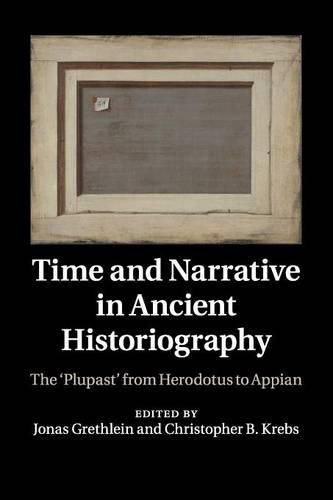Readings Newsletter
Become a Readings Member to make your shopping experience even easier.
Sign in or sign up for free!
You’re not far away from qualifying for FREE standard shipping within Australia
You’ve qualified for FREE standard shipping within Australia
The cart is loading…






Historians often refer to past events which took place prior to their narrative’s proper past - that is, they refer to a ‘plupast’. This past embedded in the past can be evoked by characters as well as by the historian in his own voice. It can bring into play other texts, but can also draw on lieux de memoire or on material objects. The articles assembled in this volume explore the manifold forms of the plupast in Greek and Roman historians from Herodotus to Appian. The authors demonstrate that the plupast is a powerful tool for the creation of historical meaning. Moreover, the acts of memory embedded in the historical narrative parallel to some degree the historian’s activity of recording the past. The plupast thereby allows Greek and Roman historians to reflect on how (not) to write history and gains metahistorical significance. In shedding new light on the temporal complexity and the subtle forms of self-conscious reflection in the works of ancient historians, Time and Narrative in Ancient Historiography significantly enhances our understanding of their narrative art.
$9.00 standard shipping within Australia
FREE standard shipping within Australia for orders over $100.00
Express & International shipping calculated at checkout
Historians often refer to past events which took place prior to their narrative’s proper past - that is, they refer to a ‘plupast’. This past embedded in the past can be evoked by characters as well as by the historian in his own voice. It can bring into play other texts, but can also draw on lieux de memoire or on material objects. The articles assembled in this volume explore the manifold forms of the plupast in Greek and Roman historians from Herodotus to Appian. The authors demonstrate that the plupast is a powerful tool for the creation of historical meaning. Moreover, the acts of memory embedded in the historical narrative parallel to some degree the historian’s activity of recording the past. The plupast thereby allows Greek and Roman historians to reflect on how (not) to write history and gains metahistorical significance. In shedding new light on the temporal complexity and the subtle forms of self-conscious reflection in the works of ancient historians, Time and Narrative in Ancient Historiography significantly enhances our understanding of their narrative art.